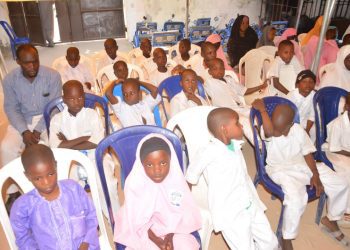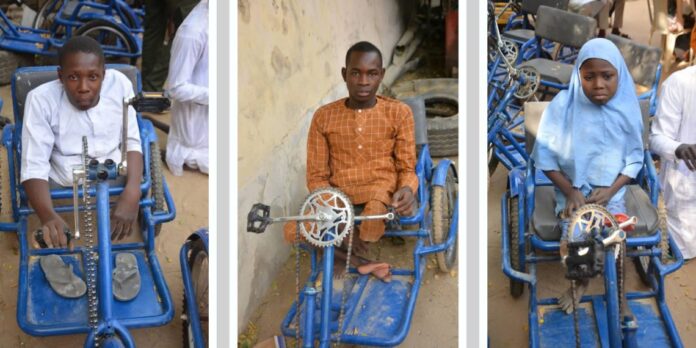By Yahuza Abdulkadir,
Early 2002, while she was still in secondary school, Adama Balla would find her way to school on a wheelchair as a result of a severe physical disability she suffers. Even though she was the only person with such deformity in her family, she was still enrolled into a conventional school to learn together alongside children who have no disability whatsoever.
During this time, she started writing a book, which is still yet to be published, about her journey and experiences as a person with disability.
“I earlier reached out to UNICEF to help me publish the book, so that people will understand more about disabilities and what it takes to survive a polio disease,” she said, noting that the representative of UNICEF in Nigeria, however, advised that she could do better in gathering persons with disabilities, especially women and building a safe space for them.
About 17 years later, that conversation now saw Balla becoming a full-time activist for people with disabilities. In 2007, the younger Balla started Zadaya Polio Survivors Association of Nigeria. Then after a few years, the name was changed to Zadaya Polio Survivors Confederation.
Finally, in 2018, Zadaya Kanem Polio & Disabilities Initiative came into existence with the aim of providing essential services that support polio eradication and engage persons with disabilities to participate in all aspects of life by integrating their issues into national development based on the United Nations Convention on the Rights of Persons with Disabilities (UNCRPD) agenda.
This initiative depends on self-funding and donations from individuals and other non-profit organizations.
“We go on social media sharing our requests and people or organisations crowd-fund our projects,” Balla told the BONews Service.
According to the World Health Organisation, polio is a dangerous disease that usually affects children under five. It’s highly infectious and one in every 200 infections leads to incurable paralysis.
To help in the eradication of polio diseases, the initiative engages in door-to-door sensitisation campaigns. By involving parents and community leaders, effective counselling sessions and vaccinations are carried out in order to tackle the issue.
A 2018 Nigeria Demographic and Health Survey estimated that 7 per cent of household members above the age of five and as well as 9 per cent of those 60 or older experience some forms of disability.
Most often, in Nigeria, persons with disabilities suffer human rights abuses that include discrimination, stigma, and violence. They even lack access to better healthcare and quality education.
That is why the initiative’s vision is to have a society that is inclusive of the disabled community, empower them with sustainable skills, and build a safe space for them to enjoy and access equal opportunities like every other individual.
The initiative leverages on the funds and materials from donors to engage persons with disabilities, mostly women, into skills training and empowerment. Through such programmes, persons with disabilities can be self-reliant and build confidence.
Zadaya Kanem Polio & Disabilities Initiative has had an enormous impact, touching the lives of persons with disabilities in Maiduguri, Borno state. Among the 200 beneficiaries of the initiative’s interventions, 70 people were provided with moving aids like walking sticks and tricycles. More than 40 children in orphanages and adults in Internally Displaced Persons (IDPs) were helped to remedy the effect of mental disabilities on them. Through the various entrepreneurship programs, about 62 persons with disabilities have learned profitable skills, making them less prone to alms-begging in the streets.
Maryam Suleiman, 30, was only 5 when she experienced a severe fever that stopped her from walking completely. Her parents couldn’t understand what was happening, so they rushed her to a hospital. From there, it turned out that her leg became paralysed.
“The leg has been paralysed. It couldn’t function again. I had to learn how to sit and crawl in that condition,” Maryam told BONews. “At the hospital, the doctors wanted to cut the leg and replace it with an artificial one. My father supported it but my mother refused because she thought someday a miracle would happen and my leg would function again. Unfortunately, it didn’t. I started using a stick to aid my movement.
Zadaya Kanem Polio & Disabilities Initiative which in recent years has become a breeding ground for persons with disabilities has done many good things to Maryam. From enrolling her in workshops that strengthen her knowledge and capacity on security, gender-based violence, and entrepreneurship where she learned to make local handmade caps.
She has understood that practicing entrepreneurship skills is very important, especially to people like her, who have a disability. With the help of the training, she is now a fashion designer.
“I sew people’s clothes and also make local handmade caps. As for the caps, I always advertise them on my WhatsApp status and people come to buy them. I love it. It makes me feel happy and fulfilled,” she said.

A few months back, through the efforts of the initiative, her dream came true when she got a tricycle that now eases her mobility to school. She uses the tricycle from her residence at Ngomari Airport to Borno State University at Njimtilo where she majors in Islamic Religious Studies.
According to what her parents said, Hassana Muhammed Bunu was born in March 1998. 12 months later, they found out that her legs stopped functioning. They were not at home when the incident started. On that day, Hassana was left in the care of a nanny who explained to the mother that since she left for work in the morning, her daughter didn’t cry or turn from sleep. After informing her father on phone about the situation, her mother took her to the hospital and they were given some medications.“The incident happened when I was a baby. One day, it happened that I couldn’t walk again and my body collapsed. Even with the medications from the hospital, nothing changes. That was how I grew up. I had to learn how to crawl because now as an adult, it’s the only way I can move,” Hassana said.
During a workshop organised by the initiative, they brought professionals to train Hassana the skill of make-up. That has helped her gain practical knowledge and experience to become a professional make-up artist too.“The initiative is helpful and supportive to us. After the training, we were given a start-up fund to utilise the skills we learned into a standard business,” she said.A 53-year-old Ali Yerima who also resides at Ngomari Airport has benefited from the initiative’s numerous feeding programs. He was provided with a tricycle and also got a grant to standardize his bicycle repair shop.“You see, I’m now here at my shop, earning a living through repairing bicycles. I don’t go out to beg anymore. This intervention has changed my life completely,” he stressed.
With this initiative, Adama Balla is proving that people with disabilities can also find the ability to thrive and become meaningful individuals in their communities.
This particular response highlighted that they can have an enabling environment where they don’t need to beg on the streets but instead learn profitable skills and utilise them in building a strong local economy that will contribute immensely to the development of the society.
There is no response without limitations; so Zadaya Kanem couldn’t expand its activities to larger communities due to limited funding and a lack of enough support and collaboration.
“We don’t have an office where we can operate officially. There is also a lack of utility vehicles to ease our outreach interventions,” said the founder, Adama Balla.
This story has been made possible by Nigeria Health Watch with support from the Solutions Journalism Network, a nonprofit organization dedicated to rigorous and compelling reporting about responses to social problems.


